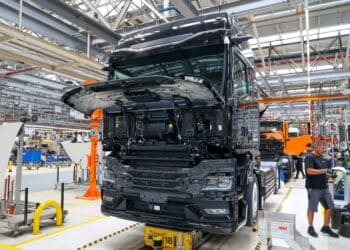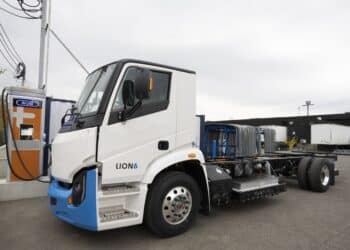Impact of new 25% heavy-duty truck tariff still unclear
Levy to take effect Oct. 1
President Donald Trump announced new tariffs on heavy trucks late Sept. 25, saying on social media that he was protecting U.S. manufacturers.
Industry experts, however, say they are awaiting clarity on what the impact of the new tariffs will be.
The measures include a 25% tariff on heavy trucks, effective Oct. 1, according to Trump’s Sept. 25 post on Truth Social. In addition, the president announced plans to add a 30% tariff on furniture, a 50% tariff on cabinets and bathroom vanities, and a 100% tariff on branded drugs from manufacturers without U.S. plants at least under construction in separate Truth Social posts
“In order to protect our Great Heavy Truck Manufacturers from unfair outside competition, I will be imposing, as of October 1st, 2025, a 25% Tariff on all “Heavy (Big!) Trucks” made in other parts of the World,” Trump shared in the Truth Social post. “Therefore, our Great Large Truck Company Manufacturers, such as Peterbilt, Kenworth, Freightliner, Mack Trucks, and others, will be protected from the onslaught of outside interruptions. We need our Truckers to be financially healthy and strong, for many reasons, but above all else, for National Security purposes!”
The new tariffs add to existing tariffs on steel, aluminum and other goods as the administration broadens its use of national security trade powers under Section 232.
Heavy-duty OEMs see mixed impact
Paccar, which builds most Peterbilt and Kenworth models in the United States and Volvo Group, which manufactures trucks in Virginia, appear to be the big beneficiaries, with shares of both companies increasing today. Paccar [Nasdaq: PCAR] improved 5.16% and Volvo Group [OTC: VLVLY] improved 4.11% as of market close today.
Paccar is awaiting further tariff details, although there’s hope it will result in better conditions for the U.S. OEM, Senior Director of Investor Relations Ken Hastings told Equipment Finance News.
“We are looking forward to reviewing the details of the MD and HD Truck Section 232 tariff announcement made by the president as they become available,” he said. “We hope that this MD and HD Truck 232 will negate the current disadvantage that those of us that proudly manufacture trucks in the U.S. currently face.”
Meanwhile, Traton Group, which sells International Motors— formerly Navistar— Scania, Man and Volkswagen Truck & Bus, appears to be the primary company negatively affected, because it assembles many of its trucks in Mexico. Traton Group [OTC: TRATF] shares declined 12.65% as of market close.
“We await the details of the Executive Order relating to 232 tariffs,” an International Motors spokesperson told EFN.
Daimler, which also saw its shares decline, down 0.75% as of market close today, also continues to monitor the situation, although it declined to comment further while awaiting details, a company spokesperson told EFN.
Trade associations respond
Meanwhile, industry trade associations also continue to navigate the announced tariffs. The National Truck Equipment Association also declined to comment as it awaits clarity on the tariffs from the White House or the Department of Commerce, a company representative told EFN.
In addition, the American Trucking Associations today referred EFN to a May 16 letter it sent to Stephen Astle, director of the Defense Industrial Base Division at the Office of Strategic Industries and Economic Security, urging the Commerce Department to avoid imposing Section 232 tariffs on heavy-duty trucks and parts, arguing that they would raise costs, extend fleet trade cycles and reduce highway safety.
The group stated in the letter that such tariffs would harm motor carriers, manufacturers and dealers while threatening jobs and the broader U.S. economy. Most imports come from Mexico under the United States-Mexico-Canada Agreement (USMCA) framework, but the administration still needs to clarify how the 25% tariffs interact with the USMCA.
Check out our exclusive industry data here.








